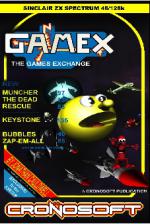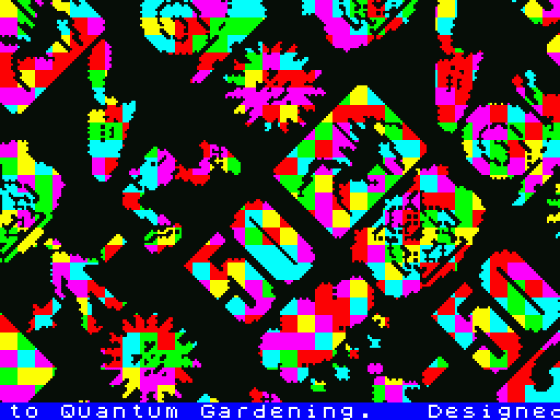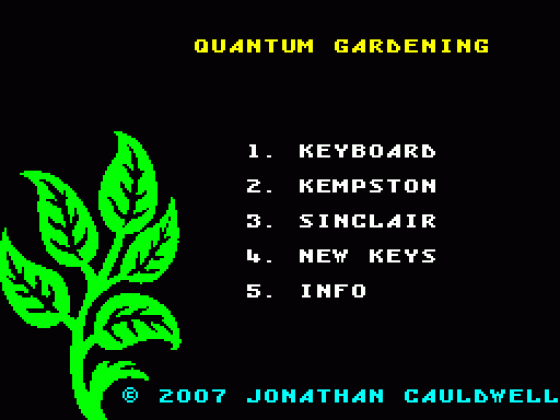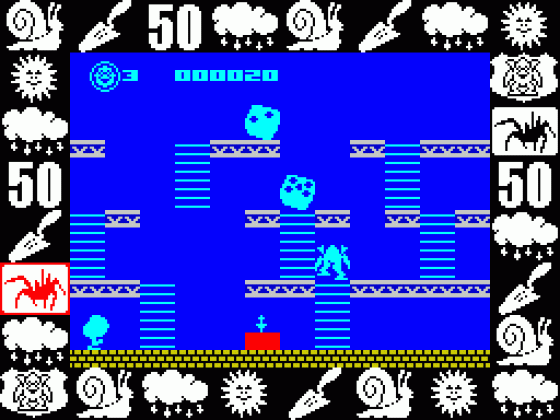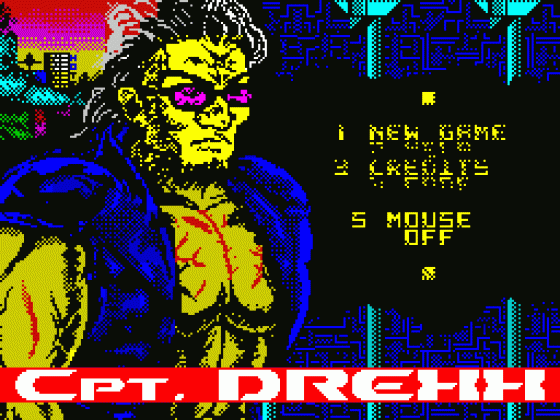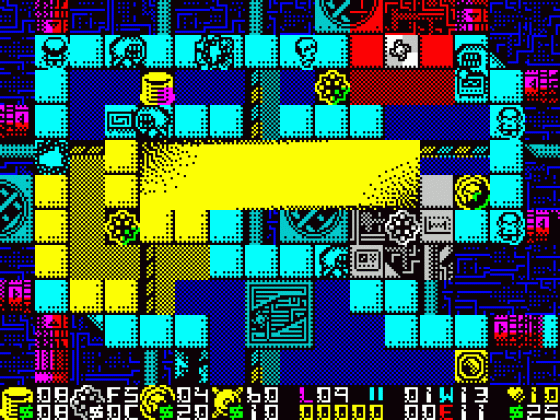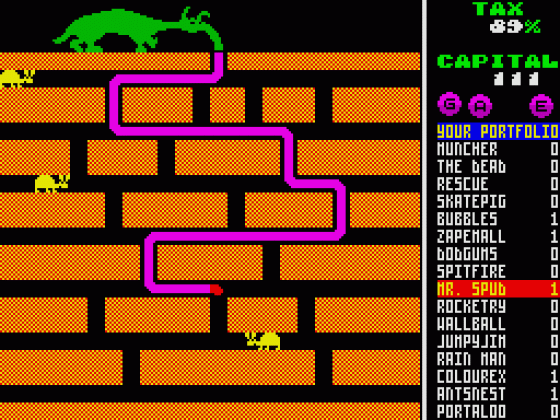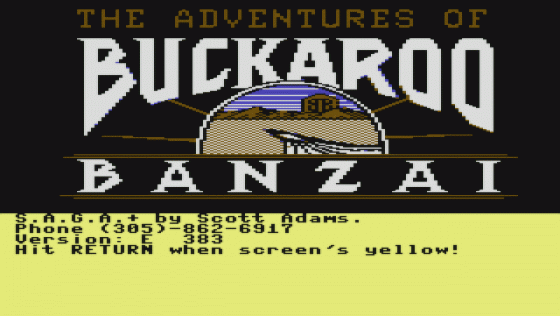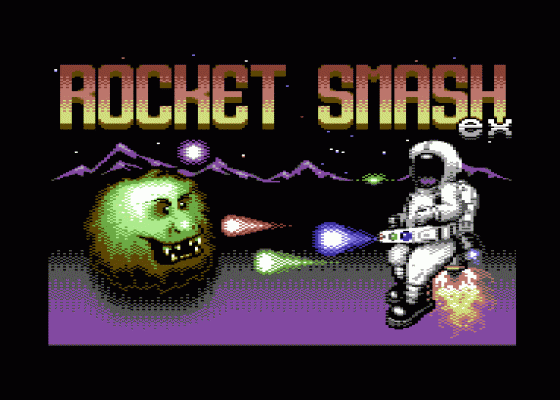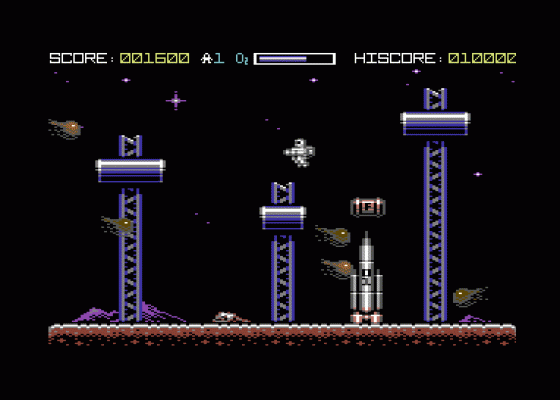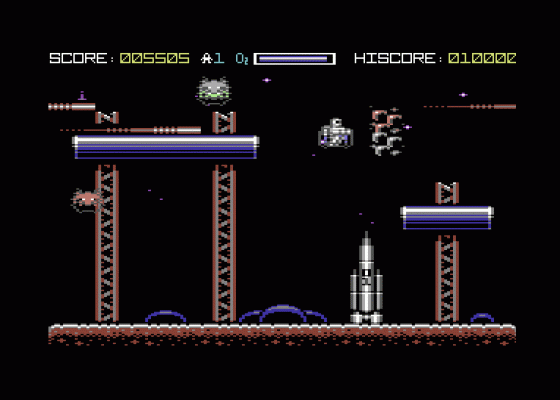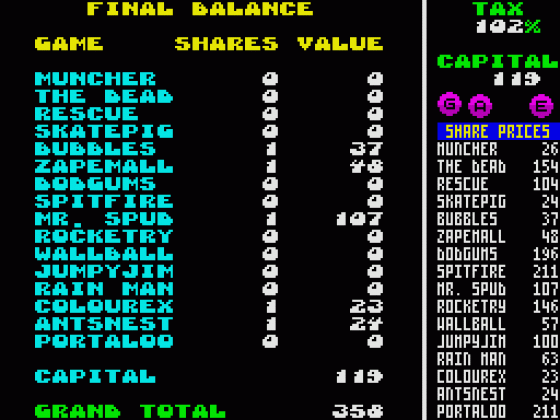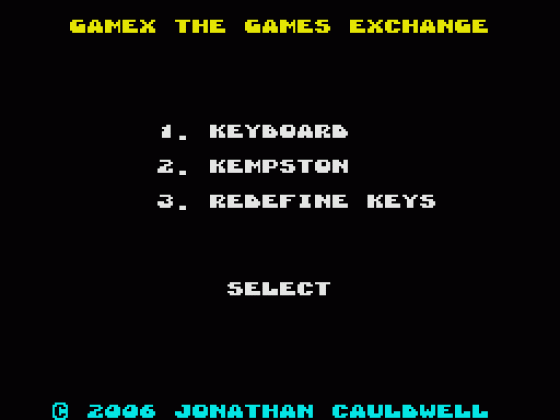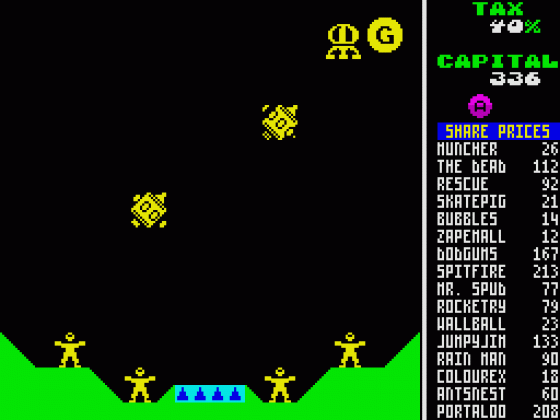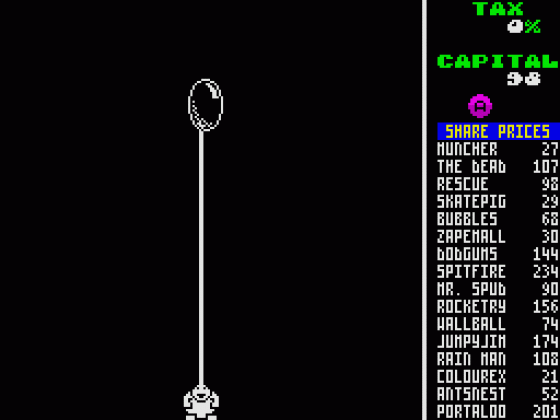
Micro Mart
 23rd April 2015
23rd April 2015
Categories: Review: Software
Author: Dave E
Publisher: Cronosoft
Machine: Spectrum 48K/128K
Published in Micro Mart #1358: April 2015 Special
Dave Edwards gets to grips with Spectrum gardening, tower defences and share dealing then eyes up two brand new Commodore releases
Introduction
Welcome to another Retro Round Up where we focus on all that's new in the world of the old. You may have noticed the focus of previous columns was entirely on 8-bit retro-gaming, heavily weighted to Spectrum, Commodore 64, BBC Micro and Amstrad games. Why, you may wonder, haven't we touched on the Atari, C16 or Colour Genie... and why I haven't yet reviewed the handheld Sega Mega Drive I received for Christmas?
As an answer, I would direct you to the wonderful Personal Computer News website (www.personalcomputernews.co.uk), where you can read the entire run of this early Eighties magazine. I write this column the same way, so the machines that ruled the roost back then also get the most space here. A notable difference however is that we no longer have to make do with black and white photographed screens. Instead, we can illustrate each review with both screenshots and a YouTube link. If you usually just skip these links then take the time to visit them. Each video lasts approximately one minute and has a full commentary (often similar, but not identical to the article itself). Moving images often convey in a few seconds what may take a reviewer a while to describe in text.
This issue we have the most intriguing selection of new releases for the Spectrum and Commodore 64 yet. Considering there was an incredible discovery for Commodore Plus/4 owners, it also gets a shout-out. We'll start out, though, by watering the plants...
It Never Rains But It Pours
Quantum Gardening is an ingenious game - combining elements of Psst, Burger Time, Monsters and Ludo. That may give you the impression that it's hard. It's not - but you shouldn't attempt it without reading its instructions. If you're watching someone else playing, it can appear positively bewildering.
You're in charge of "Eadwig" and his sole job is to make the plant in the bottom centre grow. To grow, it needs rainwater, so that means the platforms above, between the plant and the sky, need to be shuffled around. That requires you to ascend and descend the ladders to each of them and remove any platform piece that may be causing an obstruction. Alas, the platforms are patrolled by a mutant Eadwig-seeking bean, and a bumble-bee that likes rearranging platforms as much as you do.
That's a game in itself but, in Quantum Gardening, that's only the half of it. Every few seconds, two dice tumble from the top of the screen and land somewhere - face up, displaying a number between one and six. If you're on one of the upper platforms these dice can be collected as soon as they appear; on other platforms you need to ease your way over to them. As soon as you do touch one of them, you trigger a move on a board game that surrounds the playing area. Any square that you advance to then causes an event, convenient or not, in the game itself. The raincloud squares are your ultimate prize as these start the all-important waterfalls to make your plant grow. Other squares - which differ by screen - award bonus points, swap the directional controls, kill the bean, infect your plant with snails or bring out the sun.
The skill of playing is never to collect a dice without first flicking your eye over to the board game and considering which square the cursor will advance to. As two dice fall simultaneously, the order in which you do (or don't) collect them is important. The two skills complement each other well - the ladders and levels are frenetic action, the collecting a strategic judgement call.
The graphics are fair, and the sound rather limited, but such is barely noticeable.
Quantum Gardening runs on the Spectrum 48K and can be purchased as an emulator image from Cronosoft. The game was produced on cassette and Simon Ullyatt of Cronosoft is considering another physical print run in the near future. So why not ask about reserving a copy if this goes ahead? See www.cronosoft.co.uk.
Hey Yo Captain Drexx
Cronosoft's latest release is the Spectrum 128K tower defence game Captain Drexx. You control a crosshair and each scene presents an overhead view of a winding path from the enemy start point to the enemy end point. After a short pause, enemies start to emerge, running along the path. If an enemy reaches the end of it, you'll be saying goodbye to one of your ten lives - so instead you'll want to invest in constructing towers by the side of the path. Towers that pound any enemy to smithereens before he can get anywhere near his goal.
A sublime version of this type of game was Fieldrunners for the iPod Touch. Captain Drexx owes a lot to this game and I'd be surprised if author Vladimir Burenko had not played it. In both, there are enemies who can withstand lesser or greater amounts of damage. Also in both there are four types of tower and when I said earlier that you would be "investing" in towers this happens quite literally. You start Captain Drexx with $20 and each tower costs $8. For every enemy you kill, you gain a $1 reward. Hence the skill is the perfect positioning, and constant upgrading, of towers to continue decimating enemies, even as they begin to increase in strength.
There are a number of screens (i.e. level layouts) to play although the game starts out with such a challenging difficulty level that there will be a fair few gamers stuck on scene one for at least a week.
It's a good try at capturing the feel of Fieldrunners on the Speccy - you can even use the pause key strategically like in the original - but there are some obvious disadvantages. Firstly, the crosshair is difficult to control and, in a game where seconds count, every mistake it makes results in what feel like unfair life deductions. Secondly, although it does some clever things with the Spectrum's colour set, it doesn't escape from that effect of looking like a monochrome game being viewed through a red or blue filter. This makes it hard to see what's going on and, quite importantly, whether your towers are actually firing!
Those are really the only criticisms and the game is a lot more engaging than some of Cronosoft's other titles. It's difficult to pin down why. A bit like Tetris, it's one of those games that, when you die, you just want to play again. I've wrestled with it now for a good five hours or so and my advice is it's definitely better to upgrade towers rather than build more of them.
You can buy your own copy of it for £3.99 plus P&P.
The Game X Factor
Our final Spectrum Cronosoft game this issue is Gamex: The Game Exchange. Gamex is almost a compilation rather than a single game - with sixteen games included across a variety of themes; platformers, pac-man and space invaders are some of the more familiar.
So far, so blah blah. However, Gamex is from the mind of Jonathan Cauldwell, so you already know there's going to be more to it. And there is - stock market trading. Instead of a menu, each game must be "bought into" before you can play it. You start with enough cash to buy Muncher (Pac-man) and The Dead (Zombies) and, once you've acquired them, you gain more cash by playing them well. Each game you have shares in also generates a dividend each "turn" and forces you to play it yet again to continue. Once you're bored of it, dump your shares in it and invest your cash in different games. Rinse and repeat.
Gamex is tape-based and designed for the Spectrum 48K. It's not multi-load which means, for sixteen games, each one has, on average, just 3K in which to run. You would never believe it! Muncher, for example, is full-screen, challenging and the sprites flow smoothly around the screen. In fact, some of the games included are so good that, had the themes not already been done to death, they would be revered as extremely competent versions in their own right.
The share-dealing idea, however unique a selling point, won't be everyone's cup of tea though. The main problem with it is that you aspire, from start-up, to play those games that you can't afford. However, being forced to play umpteen games of Muncher to get them has quite a damaging effect on that aspiration. Even though the games are good versions, none of them are built for continued play; you don't tend to play games like Zombies ad infinitum - so when its dividend pops up you groan rather than excitedly dive in again.
Gamex is still a superb game however and, considering the Spectrum's limitations, what has been squeezed into a single block of code is almost miraculous. Available from Cronosoft at £3.99 plus P&P.
Bucking Hell
Buckaroo Banzai isn't a new retro game per se, nor is the new Commodore Plus/4 version of it a new release by some homebrew developers. However, the story of how it has been recently discovered is certainly interesting enough for me to give it a mention this issue.
Originally one of the last text adventure games from Adventure International, Buckaroo Banzai was written by Scott Adams and released for a multitude of formats in the mid-Eighties. Amongst these was the Commodore 64 which received a graphical version on 5.25" disc. The game is an extremely tedious quest to fix a jetcar with a flat battery. With or without graphics it's pretty uninspiring. Many versions on many formats were so bugged that their releases were considered a scandal back in the day. However, the C64 version did work well and so remained pretty much the only option for those fans of the cult movie to puzzle over.
Until that is, a few months ago, when someone stuck an upside-down Commodore 64 disc into a Commodore Plus/4 drive and, to his amazement, found himself playing a complete version for the Commodore Plus/4. As there is no clue to its existence on the packaging, the disc or the inlay, it had remained undiscovered for over thirty years.
Buckaroo Banzai features some nice chaining puzzles, as Scott Adams was somewhat famous for. One of these is when you must clamber up a wire to reach a crystal buried in a rocky mountain. You have a pickaxe but need both your hands to climb, meaning you can't chop the crystal out when you ascend to its location. The solution? Tie the end of the wire to the pickaxe, climb it and then haul the wire up to the new location, bringing the pickaxe with it. Clever stuff.
The graphics are also imaginative and really bring the adventure to life, particularly those of the stricken jetcar which are particularly good. There's even a few rudimentary animation sequences when you perform actions like digging.
Alas, that's not a recommendation to go play it - although it's clearly better than a version where you clamber into Buckaroo's jetcar only to get trapped inside it! The big problem is loading times. They are so long - despite this being disc-based! - as to ruin Buckaroo Banzai entirely. Even a simple TAKE PICKAXE results in the screen displaying "Please Wait" for half a minute before writing "You have the pickaxe". Fancy just going through it with a walkthrough? Set aside half a day.
Personally, I'd bet Adams and his team realised this Plus/4 version was the game equivalent of Lost In Translation as soon as they attempted to play through it. So perhaps this explains why it never saw the light of day until now.
Rocket Smash Ex - Retro Find Of The Month
So far - in the entirety of this column's history - I've reviewed three games for the Commodore 64 by Psytronik Software. All three of them have been completely new ideas with gorgeous graphics and whole teams involved in their development. Rocket Smash Ex is the first Psytronik game however that has me totally blown away.
The game is fantastically simple. You control a spaceman. Your objective on each screen is to manoeuvre through platforms collecting the items that fall from the top of the screen. In succession, two pieces of rocket will fall, then three fuel pods; each item obligingly waiting to drop until you have dealt with the previous one. You know exactly where each item needs to be dropped because the very first piece of your rocket is positioned there at game start. So all you need to do to complete a screen is grab each item that falls and take it to that very place. Last fuel pod will operate the rocket thrusters and you can board it and escape to a more difficult screen.
If you're thinking that all sounds just like Jet Pac, that's because it is - Rocket Smash Ex is a souped-up version of the old favourite. You won't be at all surprised to find that managing to improve this classic has given Psytronik an instant winner.
Yes, from the thunderous sampled "Get Ready", through the amazing music, graphics and sound effects to the booming "Game Over" terminator, Rocket Smash Ex is a smash in all senses. Each screen has a different spectrum of aliens, who attack with a different strategy. Every four screens you get a swift cutscene which increases ambiance without being intrusive. The game controls are exceptional, allowing you to gracefully glide or carefully tread from A to B as current conditions require. Collide with an alien and you audibly groan but the game merely freezes, makes its point and then continues. This is a great approach; some other versions force you to start from rocket piece one again. Not so here.
There's a high score table, an extensive options menu and a choice of sound. I've personally experienced some of the laziest ports of Jet Pac imaginable on other machines and this is the best version I have played ever.
It's available now - although selling fast, for obvious reasons - from Psytronik for £4.99 plus P&P.
Calling All Homebrew Developers
In rounding off this article, and assuming that those authors of the games featured do read my thoughts on them, Retro Round Up is your chance to have any game you are writing immortalised in the pages of Micromart. All you need to do is drop a quick e-mail to us attaching an emulator version of the game and stating its price (if not free) and any pertinent information about it. Make sure you mention its release date and as if it needed saying, make sure it's retro.
Contributions or not - and assuming I can tear myself away from Rocket Smash Ex - I'll be back next month.

